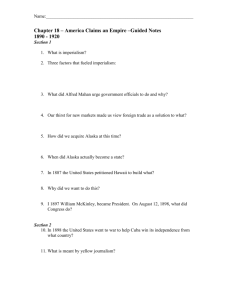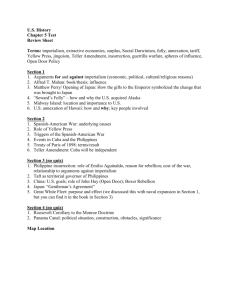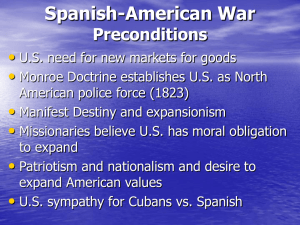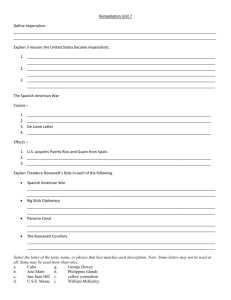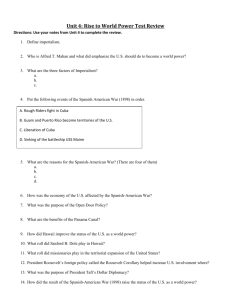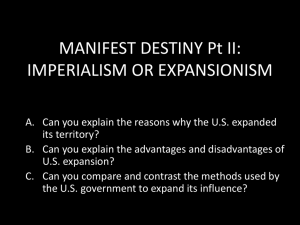U.S. Becoming a World Power Notes
advertisement
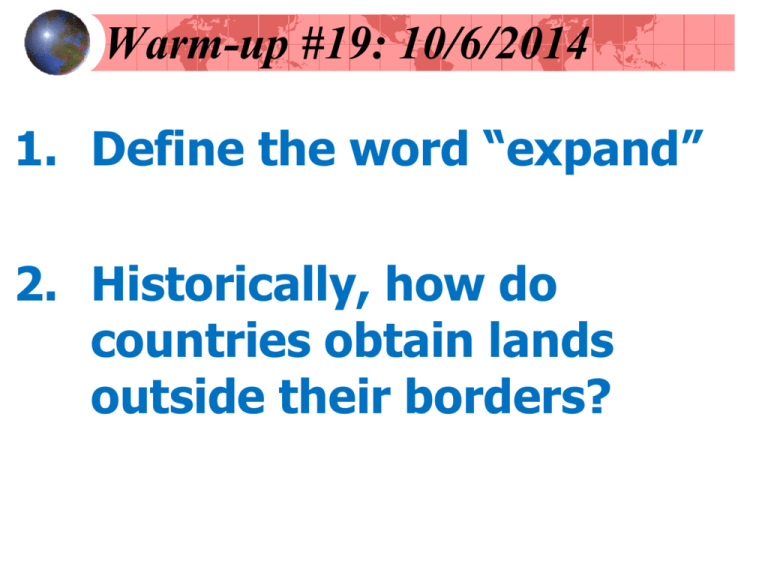
Warm-up #19: 10/6/2014 1. Define the word “expand” 2. Historically, how do countries obtain lands outside their borders? Becoming a World Power 10/6/14 1872 - 1912 The Imperialist Vision Imperialism – economic and political domination of a strong nation over a weaker one Became popular with countries in Europe Imperialism (cont) Protectorates – countries under the guidance and guardianship of an imperial power New sources of raw materials New trade markets Advantages over rivals Imperialism /Expansionism(cont) Americans wanted to develop overseas markets Make money & keep economy strong Social Darwinists believed that nations were also competing and only the strongest would survive Imperialism /Expansionism(cont) “Anglo-Saxonism” – the idea that English speaking nations were superior to others and destined to dominate the planet Imperialism/Expansionism (cont) Captain Alfred T. Mahan – published The Influence of Seapower Upon History, 16601783 A large navy was essential to protect trade Overseas territory was necessary for naval bases Monday’s Agenda 1. Read America Claims an Empire Article 2. Answer questions 1-4 on article in your journal. (Make sure you write the questions) 3. Start Expansionism Word Wall Expansionism Word Wall Jarrett PG. 135 Insurrection Missionaries Territory Isolationism Imperialism Self-determination Societal needs Expansionism Diplomacy Internationalism Industrialization Henry Cabot Lodge Alfred Thayer Mahan Theodore Roosevelt Panama Canal Spanish-American War Sanford B. Dole U.S.S. Maine Platt Amendment Queen Liliuokalani Open Door Policy Boxer Rebellion Big Stick Policy Dollar Diplomacy Foreign Policy Yellow Journalism Warm-up #20 10/7/2014 Alfred Thayer Mahan reading on P. 142 of Jarrett Book Answer the two questions that follow the reading (Make sure you write the questions) ***TURN IN WORD WALL FROM YESTERDAY*** Tuesday’s Assignment 1. Read pages 138-139 of Jarrett Book over Spanish American War 2. Complete graphic organizer on page 140 of Jarrett Book (Get Stamped for daily grade) 3. Mapping exercise over Spanish American War from page 80-81 in atlas (Turn in) 4. Exit Ticket- Was the Spanish-American War justified? Give specific reasoning for your opinion Imperialism (cont) The United States had an interest in Hawaiian sugar industry Strips the king of much of his power U.S. builds naval base at Pearl Harbor Imperialism (cont) Queen Liliuokalani comes into power in 1891 Tries to restore power to her throne American planters resist and depose her Sanford B. Dole heads new government Petition to be let into the U.S. Became a U.S. territory in 1900 Spanish American War 1898 The Spanish-American War Cuba – was a Spanish colony which mainly exported sugar 1868 – Cuban rebels attempted to gain their independence but failed Cuba The Spanish-American War (cont) José Martí – writer, poet & leader of the Cuban revolution Attempted to raise money and support for Cuba’s independence 1895 – Martí starts a second, more successful rebellion Gains control of eastern Cuba The Spanish-American War (cont) Yellow Journalism – sensational, biased, and often false reporting for the sake of attracting readers U.S. newspapers began to influence American opinion about Cuba The Spanish-American War (cont) Enrique Dupuy de Lôme – Spanish ambassador to the US, wrote a letter describing President McKinley as weak New York Journal printed the letter Americans become angered The Spanish-American War (cont) 1898 – U.S.S. Maine, mysteriously explodes 266 American sailors are killed Americans blame Spain The Spanish-American War (cont) The U.S. fights the war on two fronts: April 1898 – US navy blockades Cuba May 1898 – US navy, led by Commodore George Dewey, attacks Spanish fleet in Battle of Manila Bay in the Philippines The Spanish-American War (cont) US army was poorly trained and equipped More died from disease and mishaps than battle One fourth of the soldiers fighting in Cuba were African American June 1898 – American troops advance toward Santiago in Cuba Battle of San Juan Hill – Charge of the “Rough Riders,” led by Colonel Leonard Wood and Theodore Roosevelt August 1898 – Spain surrenders “In any moment of decision, the best thing you can do is the right thing. The worst thing you can do is nothing” The Spanish-American War (cont) Treaty of Paris (Dec. 10, 1898) – Cuba gains independence, U.S. gets Puerto Rico, Guam, and Philippines U.S. paid $20 mil for Philippines The Philippines Emilio Aguinaldo‘s troops attacked American soldiers America set up reconcentration camps to separate guerrillas from civilians • Thousands died from disease and starvation William Taft introduced reforms in education, transportation, and health care Hostilities stopped by 1902 Puerto Rico Foraker Act (1900) makes Puerto Rico an unincorporated territory 1917, Puerto Ricans were made citizens of the U.S. 1947, Puerto Rico was allowed to elect its own governor Cuba The Platt Amendment to the Cuban Constitution specified: could not make a treaties U.S. can buy or lease naval stations debts had to be kept low U.S. allowed to protect Cuban independence and keep order Warm-up #21 10/8/14 Explain the cartoon and event below. The U.S. Open Door Policy with China 10/8/2014 Influence in China 1894 – Japan and China went to war over control of Korea Japan won and gained Manchuria War proved that: • China was weak • Japan had successfully adopted western technology China (cont) Russia forced Japan to give Manchuria back to China Sphere of influence – an area owned by one country but controlled by another foreign power China (cont) Open Door Policy – all countries should be allowed to trade with China America sent notes to all countries with influence in China, asking them to keep ports open to all nations China (cont) Boxer Rebellion – a secret Chinese group tried to end foreign control in China More than 200 foreigners were killed or taken prisoner An international force stopped the rebellion in 1900 http://www.youtube.com/watch?v=F4QdEKj Eg88 1. Read and summarize pg. 145 of Brown Book (goes under your warm-up) 2. Read primary source documents and complete half sheet. (STAPLE UNDER WARMUP AND SHOW MS. CLIFT) 3. Complete “Acquiring New Lands” worksheet using BLUE BOOK PG. 352 (TURN IN) Teddy Roosevelt-Foreign Policy September 9, 2014 America as a World Power Sept. 6, 1901 – McKinley is shot and killed Theodore Roosevelt is the youngest person to become president • Wanted the U.S. to become a world power • Duty to shape the “less civilized” parts of the world “Speak softly and carry a big stick; you will go far.” World Power (cont) Russo-Japanese War Roosevelt negotiated peace and won Nobel Prize in 1906 Relations between Japan and US worsened, they both wanted influence in China Both agreed to uphold Open Door Policy World Power (cont) The Great White Fleet Roosevelt sent 16 U.S. battleships to sail around the world as a show of the country’s military might Did not help relations with Japan World Power (cont) Hay-Pauncefote Treaty (1901) – gave U.S. exclusive rights to build and control a proposed canal through Central America 1903 – Panama declares independence from Columbia Supported by America World Power (cont) Construction on the Panama Canal began in 1904 and took 10 years to complete 50 miles long 27,500 workers died during construction Shortened distance from Atlantic to Pacific Ocean by 8,000 miles World Power (cont) Roosevelt Corollary to the Monroe Doctrine – U.S. would intervene in Latin American affairs when necessary to maintain stability in the Western Hemisphere First applied to Dominican republic Latin America resented America’s growing influence World Power (cont) Dollar Diplomacy – Taft believed if American business leaders supported Latin American and Asian development, everyone would benefit Increase trade American businesses increase profits Latin American countries would rise out of poverty and social disorder http://www.youtube.com/watch?v=v_5yNiTEfVw

